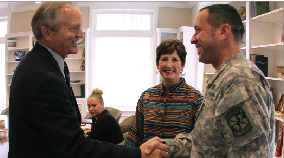

Matt Hellman | Lariat Photo Editor
By Linda Wilkins
Assistant City Editor
From the battlefield to Baylor, some students are transitioning from military life to a life of academia.
To help with the transition to college life, the Veteran Educational and Transition Services (VETS) Center is available this year to help student veterans reach their academic goals.
Hewitt senior Rachael Harrelson is a student veteran and was a medic and served on board two ships during her time in the military. She also served in Operation Iraqi Freedom and in the global war on terrorism.
However, Harrelson said transitioning to Baylor was intimidating.
“I was in my late 20’s, going to school with 18 and 19-year-olds, and I felt behind in my career because of it,” Harrelson wrote in an email sent to the Lariat.
While Harrelson said she is able to balance being a wife, mother and student, she understands the difficulties associated with transitioning.
There are 70 student veterans enrolled at Baylor using the G.I. Bill, which is an act intended to help veterans pay for their education.
Harrelson said the VETS center is a positive part of the transitioning process.
Dr. Janet Bagby, senior lecturer in education psychology and the coordinator of the VETS center, said the mission of the service is to support the academic success of student veterans at Baylor.
Bagby said she has done research for the past three years on student veterans on college campuses, and she realized that student veterans do need extra support for the transition from the military to campus.
“This support is needed because these students have come from a highly structured environment of the military to the unstructured environment on campus,” Bagby said. “We are working to assist student veterans in meeting their academic goals.”
Bagby said the VETS center is located in room 110.13 in the Army ROTC center on Speight Avenue.
A transition coach is available to help student veterans make the transition to campus. This coach is available from 9 A.M. to 3 P.M Tuesdays and Thursdays.
This year, Lanette Thompson, a doctoral student in the educational psychology graduate program, will serve as the transition coach.
“I’m going to be personalizing and giving help to student veterans,” Thompson said. “If they need help with classes or transition experiences then we’ll talk, and I can refer them to the success center, OALA or the counseling center.” OALA is the office of Access and Learning Accommodation at Baylor that assist students with disabilities or special needs.
Thompson said she will individualize her advice to each student veteran that comes to her for help.
“They can know there is someone there who cares and will do anything possible to help them succeed,” Thompson said.
While Thompson is not a licensed counselor, she said she can offer her advice and help to student veterans, especially because she has had overseas experience. Thompson lived in Africa for 26 years doing mission work. During that time, she experienced several government take-overs and witnessed poverty. She said these situations were similar to what a veteran might have seen.
The VETS center is funded by Baylor and located under the Office of Enrollment Management.
Veterans of Baylor, a student club started in November 2011, complements the VETS center and offers student veterans a community on campus, Bagby said.
“Our slogan is ‘from salutes to sic ’ems,’” Bagby said.
Harrelson, president of Veterans of Baylor, said the club offers the friendship aspect of being a college student while the VETS center offers academic support. She said there is a sense of camaraderie among veterans, especially because many of them are older than other non-veteran college students.
“It is a student club, and so the membership is open to all student veterans on campus,” Bagby said. “It is meant to build community and provide support for our campus veterans.”
Bagby, the faculty adviser for the Veterans of Baylor, said any student veteran is welcome to come to the meetings, which are held at 5:15 p.m. every second Thursday of the month in the Army ROTC office. Spouses, relatives of veterans and ROTC members are also welcome to the meetings.
She said the meetings are to plan community service events or ceremonies such as a Veterans Day memorial or to hear speakers.





